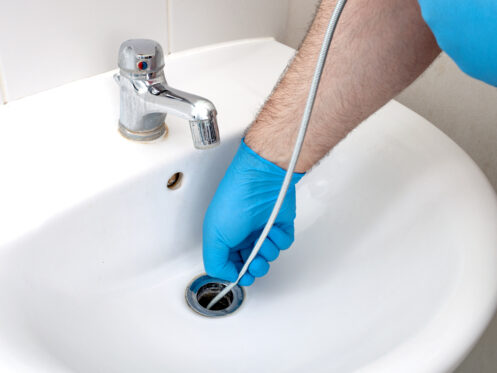Household plumbing tends to be one of those areas where homeowners don’t have a vast amount of knowledge. This lack of information can lead homeowners to believe myths that simply don’t have any factual backing. Fortunately, we’re going to debunk some of the most common plumbing myths to help you learn more about your household plumbing system.
You Can Flush “Flushable” Wipes
The idea of having flushable wet wipes can seem like a godsend for both parents cleaning toddlers and adults tidying themselves. However, it’s important to realize that these wipes aren’t actually recommended by licensed plumbers. Even though “flushable” wipes are intended to disintegrate over time, they don’t do so fast enough. Rather, they can get stuck within your plumbing drains and end up collecting more and more material. This can lead to some nasty clogs. Do yourself a favor and avoid using “flushable” wipes that aren’t really flushable.
Save Money With a Brick in the Toilet Tank
Another common myth that was widely circulated just a few years ago was that you could save money by placing a brick within your toilet’s tank. The idea behind this concept is that the brick will displace some of the water in the toilet tank. This will cause the toilet tank to use less water when refilling. While putting a brick in the toilet tank does allow you to use less water in your toilet, therefore saving money, that’s not the whole story.
Brick is a porous material that will break down in the presence of water. Over time, small sediments from the brick can find their way into your toilet water and create real problems like clogging and premature wear and tear on your toilet’s internal parts. Most newer toilets are much more efficient than older models, so there’s really no need to reduce the amount of water in a toilet’s tank.
Hot Water Will Prevent Grease Clogs
Grease has been known to gum up piping and cause clogs. Homeowners have tried to prevent this problem by using hot water to help flush grease down their drains. While hot water will liquify the grease as it starts down the drain, the grease will become colder as it travels further down the line.
Once the grease becomes cold, it will solidify on the inside of your drain pipes. This will create a sticky substance that will attract other objects that are flushed down the drain, such as hair or soap scum. Instead of flushing grease down the drain, pour it into a container. Empty soup cans make a great location for your grease to solidify and be thrown away in the trash.
Use Drain Cleaners Monthly
Many proactive homeowners are trying to avoid clogging up their drains by using a drain cleaner on a monthly basis. Unfortunately, this isn’t the best of ideas. Drain cleaners have many different chemicals in them. These chemicals can be extremely damaging to the inside of your pipes. Over time, they can lead to corrosion that causes the need to prematurely replace your home’s plumbing.
Ice Cubes Sharpen Your Garbage Disposal
Another common myth you may have heard is that you can sharpen your garbage disposal blades by putting ice cubes into the device. Ice in no way has the ability to sharpen a metal garbage disposal blade. However, with this being said, it’s still a good idea to put ice cubes down your garbage disposal. The thickness of these cubes will help to knock off any food debris that has been stuck on the blades.
A Rumbling Water Heater Will Explode
First and foremost, water heater explosions are extremely rare. When your water heater starts to make a rumbling noise, it’s an indication that there is an excess buildup of sediment inside your water heater tank. As the layers of sediment build up over time, they will eventually cover the heat exchanger. As hot water is forced up through the various layers of sediment, the hot water bubbles make a rumbling noise. When you hear this rumbling, it’s time to flush out your water heater to remove that excess sediment buildup.
Lemons Are Great for Cleaning Your Garbage Disposal
Another plumbing myth that simply isn’t true is that putting lemons down your garbage disposal will help clean it. While it’s true that the scent of lemon is great for making a room smell fresh, there’s no cleaning that takes place. Rather, these lemons can end up clogging your garbage disposal and pipes. The citric acid isn’t ideal for your metal garbage disposal blades either, as it could cause corrosion over time.
Bleach Tablets Are Ideal for Your Toilet
While bleach is a great cleaning solution, it’s not the best option for your toilet. Bleach can cause unwanted corrosion of your toilet’s internal components. Over time, this can lead to leaks and costly toilet malfunctions. Instead of using bleach tablets, it’s best to opt for traditional cleaning methods. Pay close attention to underneath the rim, around the waterline, and in the bowl.
Toilets Flush Backwards in Australia
Ever since that one episode on “The Simpsons,” the myth that toilets flush backwards in Australia has become wildly popular. However, there is no truth to it. The deep-seated belief behind it is due to the Coriolis effect. This natural effect is the reason that hurricanes change direction depending on whether they’re in the northern or southern hemisphere. However, the Coriolis effect isn’t strong enough to change the direction of flushing water in a toilet bowl.
Boiling Water Will Unclog Your Pipes
If your drain is clogged, you may think that it’s the result of grease buildup. To help soften the clog, you may want to pour boiling water down your drain. This isn’t the best idea. Residential piping materials like PVC aren’t intended to handle an excessive amount of boiling water. Rather, it can damage the piping and its joints to the point where they become too weak and eventually leak. Turn to us for drain cleaning.
A Slow-Dripping Faucet Isn’t a Big Problem
When you notice that your faucet has a slow drip, it may be easy to discount it as a small issue you can get to whenever you want. However, just a small drip can be costly when left over time. Eventually, that small drip is going to turn into a larger one. It’s best to have the small leak fixed as soon as you notice that there is a problem.
A Toilet Plunger Is Necessary for Removing Clogs
A toilet plunger is a great tool to have in your home to help with certain problems. However, it’s not a one-size-fits-all solution for plumbing issues. Plungers can be used when there is a clog in the toilet as long as there is no risk of overflow. When it comes to sink clogs, you can’t use your typical toilet plunger. Rather, you need a specialized sink plunger. In cases where clogs are deeper in your plumbing line, a drain snake or professional auger may be necessary to remedy the situation. Turn to us for toilet repair.
Call the Plumbing Experts
Polar Plumbing, Heating & Air Conditioning is proud to offer high-quality plumbing services for the entire Newburgh, NY region. We can also help with all of your heating, cooling, ductless mini-split, and indoor air quality needs. Contact our friendly staff today to schedule your next service appointment with one of our experienced plumbers or technicians.

